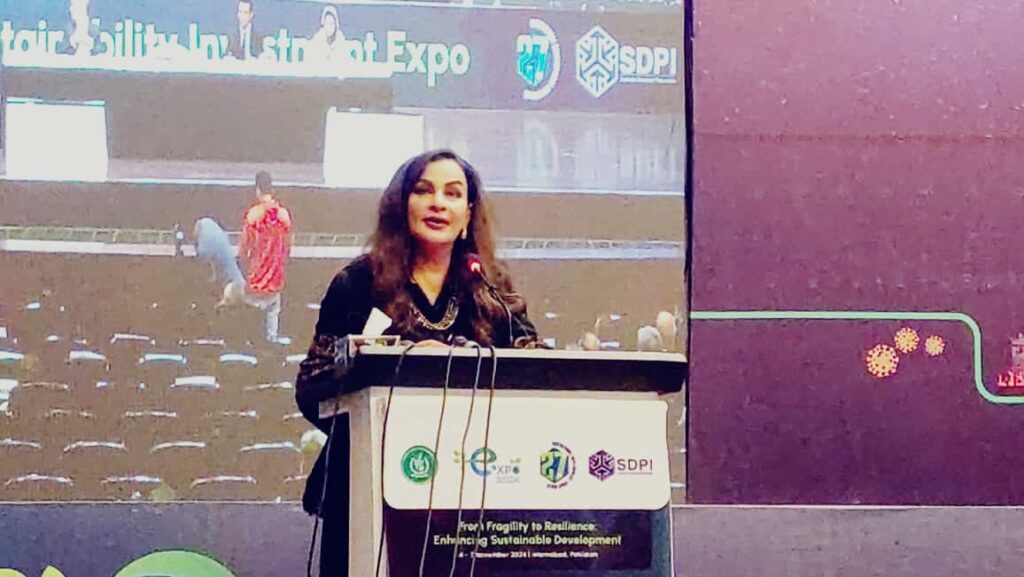
Islamabad, Senator Sherry Rehman, Chief Guest and Keynote speaker at the 27th Sustainable Development Conference (SDC) and Sustainability Investment Expo organized by the Sustainable Development Policy Institute (SDPI), highlighted Pakistan’s urgent need for innovative, resilient, and sustainable solutions to combat the challenges of climate change. Under the theme “Pioneering Solutions for Climate Resilience,” Senator Rehman also presented awards in categories recognizing excellence in sustainability across diverse sectors, from Agri-Tech and ESG Integration to Circular Economy and Renewable Energy.
In her address, Senator Rehman highlighted the importance of moving beyond superficial sustainability and addressing real resilience, describing the Expo as “a creative and inclusive platform” that is mobilizing both small and large enterprises towards a sustainable future. She emphasized that the pathway to sustainability must include all sectors, including youth innovators and women-led corporations upholding ESG values.
Reflecting on the 2022 floods, Senator Rehman stated, “We are all survivors of a great flood. This was a transformational moment for Pakistan, and as we rebuild lives, we must do so through locally-rooted, sustainable solutions that empower communities without solely relying on loans or short-term aid.” She noted that resilient housing projects in Sindh like the Sindh People’s Housing for Flood Affectees (SPHF) and homegrown solutions are helping flood-affected communities imagine a secure future. However, she called for increased attention on funding, frameworks, and regulation to support these initiatives sustainably.
Senator Rehman addressed Pakistan’s critical vulnerabilities as the world’s 5th most populous and 5th most climate-vulnerable country, exposing it to severe hazards. She stressed the need for “metaphorical fences” to control environmental threats, especially pollution. “Pollution is the real serial killer. Yet, we only seem to care when it reaches disaster proportions, with Lahore’s air becoming uninhabitable, the smog-choked city’s air quality is nearly 40 times above the World Health Organisation’s (WHO) acceptable limit,” she said, calling for action beyond crisis responses. She emphasized that National Clean Air Policy 2023 should be implemented holistically. However, she criticized the tendency to ignore these solutions until disaster strikes.
She highlighted the role of climate-friendly technologies, citing the success of zig-zag technology in brick kilns and improved vehicle emissions through vehicle tuning. Senator Rehman urged for a media category in future sustainability awards to foster constructive and conscious climate reporting, stating, “The media has an enormous role. Reality checks only resonate when the media amplifies them.”
The Senator also spotlighted pressing issues like circular economy and waste management, noting that Pakistan produces 30 million tonnes of waste annually but recycles only 1%, while only 9% plastics get recycled globally. She asserted that waste represents a multi-billion dollar opportunity and must be seen as a circularity challenge rather than a metropolitan issue.
Addressing water scarcity, she warned against over-reliance on large dams and highlighted that Pakistan is the 4th highest per capita water user, facing critical water shortages. She also called attention to the pollution of Rawal Dam, which receives 9 million gallons of sewage daily, reinforcing that citizens must become agents of change.
Senator Rehman celebrated Pakistan’s Delta Blue Carbon Project in Sindh as a global leader in decarbonization, with the restoration of 350,000 hectares of mangroves that generate an estimated 3.1 million tons of carbon credits annually. This initiative, she noted, represents a groundbreaking model, with mangroves sequestering carbon at four times the rate of tropical forests and driving significant revenue for Pakistan. “This is the world’s largest mangrove reclamation project, creating jobs for women and helping Sindh earn billions,” she highlighted, stressing the need for continued leadership through such innovations.
On renewable energy, Senator Rehman hailed the recent “rooftop revolution,” with Pakistan importing 15 GW worth of solar panels from China this year, amounting to a third of Pakistan’s energy capacity. Additionally, she celebrated the Benazir Income Support Programme (BISP) for its pivotal role in gender equality, stating, “BISP has disbursed $70 billion following the floods, establishing a gold standard for social protection.”
The Senator concluded her keynote by urging the audience to lead a sustainable lifestyle, echoing the need to “consume less and conserve more” and encouraging all stakeholders to take actionable steps in support of climate resilience. “All paths of the future lead to sustainability. This conference has showcased that sustainability is not just a goal—it is a way of life,” she said.
The Expo served as a call-to-action for policymakers, businesses, and individuals alike to forge a sustainable future together.
